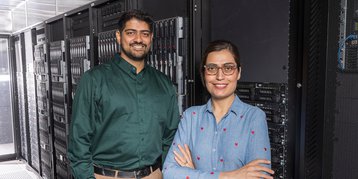The US National Science Foundation has granted another round of support group to a data center research group led by Binghamton University, New York.
The Center for Energy Smart Electronic Systems (ES2) combines academic and industry research on reducing energy consumption by data centers. The next phase of its research will involve the University of Texas at Arlington as well as Villanova University, with support from industry organizations including Microsoft, Meta (Facebook), Bloomberg, Verizon, Corning, Nvidia, and Honeywell.
“We are doing this at every level of thermal management, from the chip to the data center, using AI and neural networks to optimize energy consumption at a multitude of scales,” said Bahgat Sammakia, ES2 director and vice president for research at Binghamton.
The group.is looking at minimizing energy wasted, and recovering the energy released as heat, and Sammakia says it has already made advances in turning data centers into dynamic self-regulating systems.
It runs a research data center and thermal lab at Binghamton, alongside an electronics cooling lab, including an immersion cooling facility, and other labs at UT-Arlington. At Villanova, it has a liquid cooling laboratory for high-powered data center equipment and a high-performance computing laboratory.
ES2 is one of 83 partnerships between industry and universities in the US, known as Industry/University Cooperative Research Centers (I/UCRCs). It was founded in 2011 with NSF money, and has so far $4 million from the government, alongside its industry finance.
Data centers are estimated to use two percent of the US's energy, according to the Department of Energy, and the ES2 aims to keep that figure in check as the sector continues to grow.
The third phase of ES2's program will look at edge computing, incorporating renewable energy sources and cooling high heat-flux data centers as well as finding innovative ways to reduce the environmental impact of the data center ecosystem.
The group hopes to automate data center systems to ensure performance, reliability, and availability with optimized energy consumption, and address the thermal challenges of dense IT equipment, which are pushing the industry towards liquid cooling.
“ES2’s expansive facilities and expertise have enabled us to achieve many of our research objectives,” said Vladimir Troy, vice president of enterprise software at Nvidia, which joined ES2 in 2020. “Several ES2 student interns proved to be such strong contributors that we hired them as employees upon completion of their PhD studies.”
ES2 has produced 40 PhDs and 65 masters amongst its researchers, who have published more than 200 papers and filed 16 patents in its first ten years.




